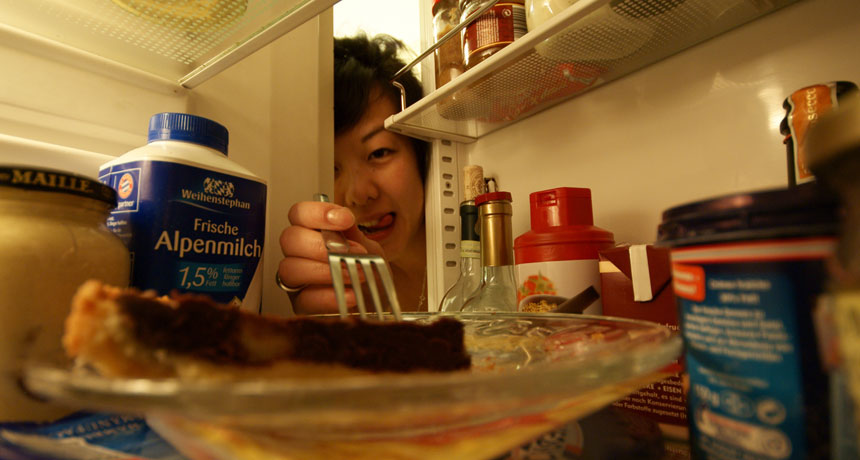News Brief: Stress may break diet willpower
People who feel they are under pressure may find it harder to resist tasty foods

Under pressure? Stress may thwart self-control in eating, a new study shows. It could make the idea of snacking on that cake far more appealing than normal.
Elephotoniric/Flicker/(CC BY-NC-ND 2.0)
You’re cramming for a test, worried about a band tryout or at risk of not finishing up some big class project on time. This is stress. And you realize it is hard to hold off eating a doughnut or dish of ice cream. That junk food looks oh so good. It can be hard to help reaching for it. And a new Swiss study now suggests why.
Indeed, the study finds, your brain may be conspiring against you. In some people, it may crumple the willpower to eat right.
Silvia Maier works at the University of Zurich, Switzerland. She and her colleagues invited 41 young men into the lab for 3 hours of tests. They started by showing each man 180 food items on a computer screen. Each time, they asked the men to judge how healthy, tasty and appealing the food was.
Then the researchers stressed out 29 of the guys. They did this by asking each to stick one hand in ice water for three minutes. If the water was too unpleasant, the volunteers could remove their hands, but must continue looking into a video camera. The men were also encouraged to put their hands back into the cold water. All the while, a researcher watched — and videotaped the ordeals.
Another 22 men held one hand in warm water. They were not videotaped.
Afterward, the researchers showed each man a series of two food items. They did this 210 times. And before they started making their picks, the men were told “to choose the healthier of the two items whenever possible.” When the testing was over, the scientists gave the volunteers a snack. Each man got one of the items he had said that he preferred.
Despite being coached to choose healthy foods, the stressed men proved more likely to pick the less healthy option.
The researchers also performed brain scans of the volunteers. It showed what part of the brain was active as they made their choices. “Our findings indicate that stress biases the decision process,” Maier’s team concluded. And it does this, they explain, by altering two brain pathways. One of the affected sets of circuits relays sensory information, such as taste. The other affects a person’s ability to set goals and make decisions to follow through on those goals — such as eating what is good for us.
The findings appear in the August 5 issue of Neuron.
More studies will be needed to confirm the new findings. But the early signs suggest that stress not only makes junk food more appealing, but also saps the brain’s ability to resist eating it.
Power Words
(for more about Power Words, click here)
bias The tendency to hold a particular perspective or to have a particular reaction. Scientists often blind subjects to the details of a test so that their biases will not affect the results.
brain scan The use of an imaging technology, typically using X rays or a magnetic resonance imaging (or MRI) machine, to view structures inside the brain. With MRI technology — especially the type known as functional MRI (or fMRI) — the activity of different brain regions can be viewed during an event, such as viewing pictures, computing sums or listening to music.
neuron The impulse-conducting cells that make up the brain, spinal column and nervous system.
sensory biology The scientific study of the cells and other biological processes that underlie the functioning of the senses.
stress (in biology) A factor, such as unusual temperatures, moisture or pollution, that affects the health of a species or ecosystem. (in psychology) A mental, physical, emotional, or behavioral reaction to an event or circumstance, or stressor, that disturbs a person or animal’s usual state of being or places increased demands on a person or animal; psychological stress can be either positive or negative.
willpower The ability to resist short-term impulses with the aim of achieving a longer-term goal. For instance, turning down the offer of your favorite cookie may be evidence of willpower in people attempting to lose weight.







